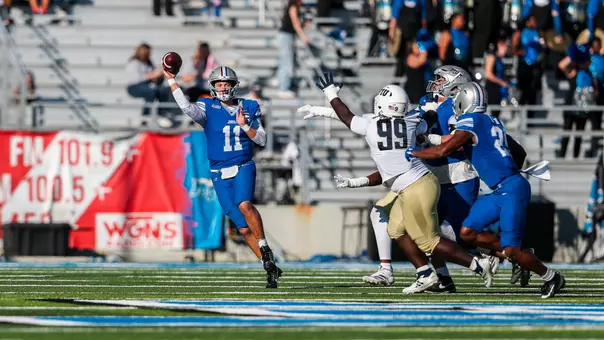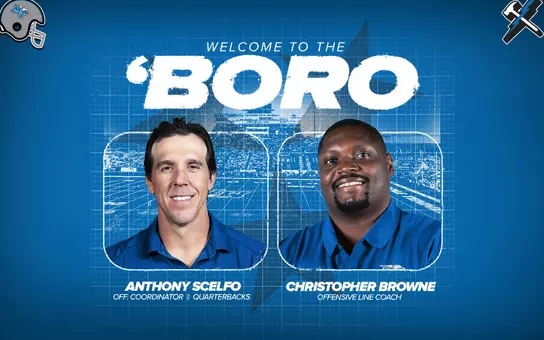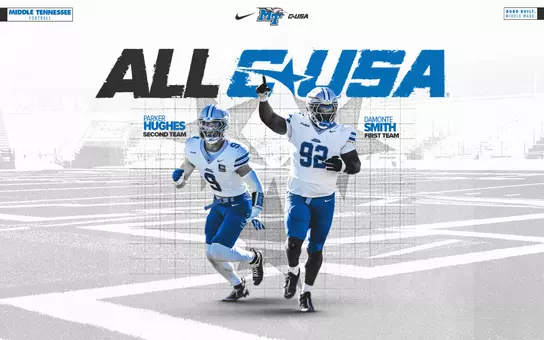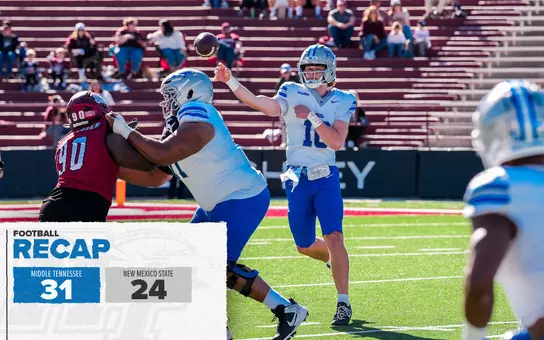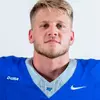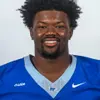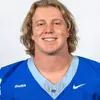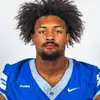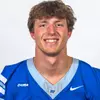Middle Tennessee State University Athletics
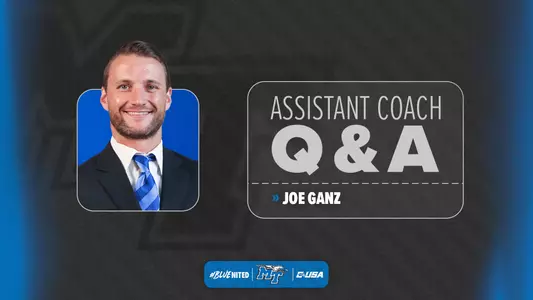
"You’re going to play hard and you’re going to be a great teammate” - Q&A with tight ends coach Joe Ganz
3/7/2024 4:47:00 PM | Football
The former Nebraska quarterback brings Blue Raider fans inside the new MTSU tight end room
MURFREESBORO, Tenn. — Joe Ganz knows exactly the type of relationship he wants to have with his players in the newly formed Middle Tennessee tight end room. It's the type of bond that he formed with Bo Pelini as Nebraska's quarterback and later Youngstown State's assistant coach, Ganz's two roles under Pelini during his football career.
It's the type of bond that pushes players to their limits to be their best, but one that understands the coach would do anything to help his players, something Pelini showed Ganz consistently throughout their time together.
"I always knew walking off the field that he had my back and that I could go up to his office at any time and he would bend over backwards for me," Ganz said. "That type of relationship is the one I want to have with the guys I coached, because that's the relationship I had with my coach."
That's a bond that extends beyond the football field, Ganz notes. One that led to Pelini, while Ganz was recruiting for Youngstown State in Ganz's native Chicago, pulling some strings with the Ricketts family, who owned the Cubs and were also big Nebraska fans, to get Ganz and his dad seats behind home plate in the 2017 season, just after the Cubs' World Series win.
"That type of stuff, you just know he would do anything, and he doesn't ask for anything in return," Ganz said.
For Ganz, it meant inviting over Tennessee Titans tight end, Kevin Rader, who Ganz coached at Youngstown State, over for dinner as soon as he was settled. And it's meant showing his tight end room, all of whom are adjusting to an offense that will require them to be major part of its success, that he trusts their ability to adapt to all the changes happening around them.
With the move to an offense that will consistently use at least one, sometimes two tight ends in many of their formations, building depth and durability in the tight end room is the most important task this spring for Ganz, who followed offensive coordinator Bodie Reeder from Northern Iowa, where he was the wide receivers coach for the Panthers. Middle Tennessee has already converted two linebackers, Slade Alexander and Nash Stidham, to join the returning "WR-H" position guys, Holden Willis, Jacob Coleman and Taharin Sudderth, as the core of the tight end room.
"We're not doing things that are completely foreign to them," Ganz said. "We're going to be asking them to a little bit more in terms of true tight end play. But there are a lot of things that they have done in the past, but just not maybe as much."
Ganz recently sat down with GoBlueRaiders.com Staff Writer Sam Doughton to discuss Ganz's background with Reeder and Pelini, building a tight end room coming into a team that didn't truly have one last year and how he and the offensive staff approaches teaching every position like a quarterback.
The conversation has been edited and condensed for space and clarity.
--
Obviously, you formed a tight bond with Bodie Reeder during your time together at Northern Iowa for you to follow him to Murfreesboro. What connected y'all early that made you want to come with him to be a Blue Raider?
We were both former quarterbacks, so we see the game the same way. We see it from a holistic standpoint, really. I think we work at the same pace. It doesn't take us long to figure out "Ok, how do we want to attack this defense from this structure?" We see it, we talk about it, and we move on. So that gave us a lot of common ground to start building upon.
And then the more you spend time with each other, the closer you become. Our families are around the same age, so our wives became good friends. It's just kind of one of those where you start working together and you see football the same way, so you start having more stuff in common and it leads to a friendship that can carry on and continue.
When we announced your hire, Reeder quote-tweeted the announcement and said "all offensive skill positions will be coached just like the QB. Same language, same detail, and same expectations." What does that mean to you? How does teaching a tight end like a quarterback manifest?
Everything we do in the offense revolves around him. We want to make sure the quarterback is taken care of first and the five offensive linemen. If our offense can be simple enough for those guys to execute at a high level, then we can teach the parts around it how the quarterback is being taught. Whether it's as simple as a tight end knowing where he fits in the progression, can I chip this defensive end to help the O-Line out or not? Where I fit, how I see coverages might change my route a yard or two in, a yard or two out, a yard or two deep, a yard or two short.
I don't teach what I call "paper routes." Yeah, we give them a playbook, but they're going to run the route how the quarterback needs them to run the route based on the coverage that they're giving. So (tight ends) must recognize coverages from a quarterback perspective in the pass game and the front and run game IDs. They must master both worlds. But the quarterback must know it all. He needs to the run the points in the run game just as much as he needs to know what safety he's reading and what concept.
The tight ends are no different. It's a great position to coach because you're involved in everything. It's an awesome position to play because you're involved in everything. The majority of the run game is going to you. You're out there on an island because if it works, great. If it doesn't, it's probably your fault. So, there's a lot of pressure on that guy, but we want to teach every position the way the quarterback sees it, so that if we're wrong, we're all wrong together. Usually if you're wrong together, someone can make a play and make it right.
You come from the roots of the Bo Pelini coaching tree, after he coached you as a player at Nebraska and you were later on his staff at Youngstown State. What did you learn from him that you take with you day-to-day as a coach?
What I learned from Bo, and I experienced this as a player, I learned how to coach my guys hard, but have them understand that I love them at the end of the day. That's all a player wants to know. Does this guy really care about me? And he is going to push me to be somebody I can't be by myself. Sometimes you struggle in those two worlds, because a player thinks if you get on him or coach him hard, you don't like him. I've learned that fine line how to push and demand a lot out of my player, but at the end of the day know that I still care about him and know that I would do anything for him.
(Pelini) was like that when I played for him. The quarterback always kind of gets coached a little bit harder than everybody else. I always knew walking off the field that he had my back and that I could go up to his office at any time and he would bend over backwards for me. That type of relationship is the one I want to have with the guys I coached, because that's the relationship I had with my coach. It made it so much better, as opposed to just football and that's it.
You're coming into an offense that last year didn't really have a tight end room. The WR-H position in the scheme last year did some tight end things, but as more of a bigger slot receiver than a true tight end. How do you approach building a room up from those guys who played that position last year?
We're not doing things that are completely foreign to them. We'll ask them to do more in terms of true tight end play. But there are a lot of things that they have done in the past, but just not maybe as much. We'll run zone, we'll run counter, we'll run all these things. They might've run it one or two times in a game, we're going to run it 5-10 times a game, 50-60 times a season.
There's always a lot of nervous energy when there's a coaching change or a new position coach. So, I try to assure them that what we're doing is not foreign to you. We're just going to ask you to do it more and more of you are going to play, which for them is exciting. Usually, it was just Holden Willis. Holden played and then maybe a couple of other guys got in sparingly. So, they're excited, because we utilize our tight ends a lot in our offense.
At the end of the day, like Coach Reeder says, they're going to dictate what we run. If they're good at something, we're going to run that. If they're not good at something, yeah, we're going to try and make them better at it. But come Saturday, (Reeder) is not going to call something that they're not good at and put them in that situation. It's on us as a position coach to make them better holistically, but we're going to do what they're good at. Obviously, without going through spring or fall camp, we don't know what that is. We're just trying to feed them everything so that they can go out and perform as much as they can. Then you figure out two weeks into fall camp, "Ok, this is our DNA."
They do have to get a little bit bigger, just in terms of a little bit more weight. Just because of the durability issue. When you're asked to move large human beings, it's easier to move them when you're bigger. Coach Blatnick and the strength staff have done a good job with those guys doing that. They're still not there yet, but you can't gain 50 pounds in three weeks.
It's been a couple of years since MTSU has used tight ends as much as y'all plan to use them. What can fans expect from the Blue Raider tight end room on the field this fall?
The first thing they must be is tough. They're almost an extension of the offensive line. It goes for everybody, but they can't care who gets praise for what happens on the field. They have to be really, really unselfish and willing to put their body in harms way for their teammates. You have to have somebody that is physical and tough and has the right mindset of "This isn't going to be fun half the time, but my give-a-crap factor about my teammate's success is high and if this offense is going to go, it's because we're going to make it go."
I have two rules. No. 1, you're going to play hard. A lot of kids don't know how hard playing hard really means. And No. 2, you're going to be a great teammate. Usually, the best players I've been around play extremely hard and they're great teammates. If you can encompass those two things, the play on Saturday usually takes care of itself. Because great teammates don't care if they get the ball one time or 11 times. They don't care if you throw it 50 times, or run it 50 times, they just want to be out there to win and help their teammates win.
As a tight end, you have to be that guy. Because there's going to be games where we're going to run the ball 40 times to win. There's going to be a time where you might catch 10 passes, you might catch two touchdowns. We're going to do what it takes to win. But they must be unselfish and tough, physically and mentally, to do their job.
It's the type of bond that pushes players to their limits to be their best, but one that understands the coach would do anything to help his players, something Pelini showed Ganz consistently throughout their time together.
"I always knew walking off the field that he had my back and that I could go up to his office at any time and he would bend over backwards for me," Ganz said. "That type of relationship is the one I want to have with the guys I coached, because that's the relationship I had with my coach."
That's a bond that extends beyond the football field, Ganz notes. One that led to Pelini, while Ganz was recruiting for Youngstown State in Ganz's native Chicago, pulling some strings with the Ricketts family, who owned the Cubs and were also big Nebraska fans, to get Ganz and his dad seats behind home plate in the 2017 season, just after the Cubs' World Series win.
"That type of stuff, you just know he would do anything, and he doesn't ask for anything in return," Ganz said.
For Ganz, it meant inviting over Tennessee Titans tight end, Kevin Rader, who Ganz coached at Youngstown State, over for dinner as soon as he was settled. And it's meant showing his tight end room, all of whom are adjusting to an offense that will require them to be major part of its success, that he trusts their ability to adapt to all the changes happening around them.
With the move to an offense that will consistently use at least one, sometimes two tight ends in many of their formations, building depth and durability in the tight end room is the most important task this spring for Ganz, who followed offensive coordinator Bodie Reeder from Northern Iowa, where he was the wide receivers coach for the Panthers. Middle Tennessee has already converted two linebackers, Slade Alexander and Nash Stidham, to join the returning "WR-H" position guys, Holden Willis, Jacob Coleman and Taharin Sudderth, as the core of the tight end room.
"We're not doing things that are completely foreign to them," Ganz said. "We're going to be asking them to a little bit more in terms of true tight end play. But there are a lot of things that they have done in the past, but just not maybe as much."
Ganz recently sat down with GoBlueRaiders.com Staff Writer Sam Doughton to discuss Ganz's background with Reeder and Pelini, building a tight end room coming into a team that didn't truly have one last year and how he and the offensive staff approaches teaching every position like a quarterback.
The conversation has been edited and condensed for space and clarity.
--
Obviously, you formed a tight bond with Bodie Reeder during your time together at Northern Iowa for you to follow him to Murfreesboro. What connected y'all early that made you want to come with him to be a Blue Raider?
We were both former quarterbacks, so we see the game the same way. We see it from a holistic standpoint, really. I think we work at the same pace. It doesn't take us long to figure out "Ok, how do we want to attack this defense from this structure?" We see it, we talk about it, and we move on. So that gave us a lot of common ground to start building upon.
And then the more you spend time with each other, the closer you become. Our families are around the same age, so our wives became good friends. It's just kind of one of those where you start working together and you see football the same way, so you start having more stuff in common and it leads to a friendship that can carry on and continue.
When we announced your hire, Reeder quote-tweeted the announcement and said "all offensive skill positions will be coached just like the QB. Same language, same detail, and same expectations." What does that mean to you? How does teaching a tight end like a quarterback manifest?
Everything we do in the offense revolves around him. We want to make sure the quarterback is taken care of first and the five offensive linemen. If our offense can be simple enough for those guys to execute at a high level, then we can teach the parts around it how the quarterback is being taught. Whether it's as simple as a tight end knowing where he fits in the progression, can I chip this defensive end to help the O-Line out or not? Where I fit, how I see coverages might change my route a yard or two in, a yard or two out, a yard or two deep, a yard or two short.
I don't teach what I call "paper routes." Yeah, we give them a playbook, but they're going to run the route how the quarterback needs them to run the route based on the coverage that they're giving. So (tight ends) must recognize coverages from a quarterback perspective in the pass game and the front and run game IDs. They must master both worlds. But the quarterback must know it all. He needs to the run the points in the run game just as much as he needs to know what safety he's reading and what concept.
The tight ends are no different. It's a great position to coach because you're involved in everything. It's an awesome position to play because you're involved in everything. The majority of the run game is going to you. You're out there on an island because if it works, great. If it doesn't, it's probably your fault. So, there's a lot of pressure on that guy, but we want to teach every position the way the quarterback sees it, so that if we're wrong, we're all wrong together. Usually if you're wrong together, someone can make a play and make it right.
You come from the roots of the Bo Pelini coaching tree, after he coached you as a player at Nebraska and you were later on his staff at Youngstown State. What did you learn from him that you take with you day-to-day as a coach?
What I learned from Bo, and I experienced this as a player, I learned how to coach my guys hard, but have them understand that I love them at the end of the day. That's all a player wants to know. Does this guy really care about me? And he is going to push me to be somebody I can't be by myself. Sometimes you struggle in those two worlds, because a player thinks if you get on him or coach him hard, you don't like him. I've learned that fine line how to push and demand a lot out of my player, but at the end of the day know that I still care about him and know that I would do anything for him.
(Pelini) was like that when I played for him. The quarterback always kind of gets coached a little bit harder than everybody else. I always knew walking off the field that he had my back and that I could go up to his office at any time and he would bend over backwards for me. That type of relationship is the one I want to have with the guys I coached, because that's the relationship I had with my coach. It made it so much better, as opposed to just football and that's it.
You're coming into an offense that last year didn't really have a tight end room. The WR-H position in the scheme last year did some tight end things, but as more of a bigger slot receiver than a true tight end. How do you approach building a room up from those guys who played that position last year?
We're not doing things that are completely foreign to them. We'll ask them to do more in terms of true tight end play. But there are a lot of things that they have done in the past, but just not maybe as much. We'll run zone, we'll run counter, we'll run all these things. They might've run it one or two times in a game, we're going to run it 5-10 times a game, 50-60 times a season.
There's always a lot of nervous energy when there's a coaching change or a new position coach. So, I try to assure them that what we're doing is not foreign to you. We're just going to ask you to do it more and more of you are going to play, which for them is exciting. Usually, it was just Holden Willis. Holden played and then maybe a couple of other guys got in sparingly. So, they're excited, because we utilize our tight ends a lot in our offense.
At the end of the day, like Coach Reeder says, they're going to dictate what we run. If they're good at something, we're going to run that. If they're not good at something, yeah, we're going to try and make them better at it. But come Saturday, (Reeder) is not going to call something that they're not good at and put them in that situation. It's on us as a position coach to make them better holistically, but we're going to do what they're good at. Obviously, without going through spring or fall camp, we don't know what that is. We're just trying to feed them everything so that they can go out and perform as much as they can. Then you figure out two weeks into fall camp, "Ok, this is our DNA."
They do have to get a little bit bigger, just in terms of a little bit more weight. Just because of the durability issue. When you're asked to move large human beings, it's easier to move them when you're bigger. Coach Blatnick and the strength staff have done a good job with those guys doing that. They're still not there yet, but you can't gain 50 pounds in three weeks.
It's been a couple of years since MTSU has used tight ends as much as y'all plan to use them. What can fans expect from the Blue Raider tight end room on the field this fall?
The first thing they must be is tough. They're almost an extension of the offensive line. It goes for everybody, but they can't care who gets praise for what happens on the field. They have to be really, really unselfish and willing to put their body in harms way for their teammates. You have to have somebody that is physical and tough and has the right mindset of "This isn't going to be fun half the time, but my give-a-crap factor about my teammate's success is high and if this offense is going to go, it's because we're going to make it go."
I have two rules. No. 1, you're going to play hard. A lot of kids don't know how hard playing hard really means. And No. 2, you're going to be a great teammate. Usually, the best players I've been around play extremely hard and they're great teammates. If you can encompass those two things, the play on Saturday usually takes care of itself. Because great teammates don't care if they get the ball one time or 11 times. They don't care if you throw it 50 times, or run it 50 times, they just want to be out there to win and help their teammates win.
As a tight end, you have to be that guy. Because there's going to be games where we're going to run the ball 40 times to win. There's going to be a time where you might catch 10 passes, you might catch two touchdowns. We're going to do what it takes to win. But they must be unselfish and tough, physically and mentally, to do their job.
Players Mentioned
MTSU Football Signing Day Press Conference 12/3/25
Wednesday, December 03
MTSU Football at New Mexico State post-game press conference – 11/29/25
Sunday, November 30
MTSU Football at New Mexico State post-game press conference – 11/29/25
Saturday, November 29
Raider Report Game 12 - MTSU vs. New Mexico State University
Friday, November 28
